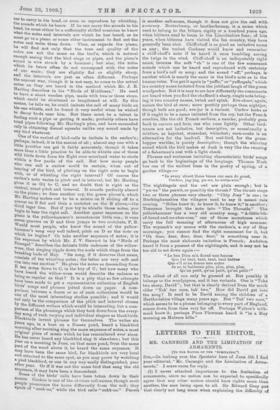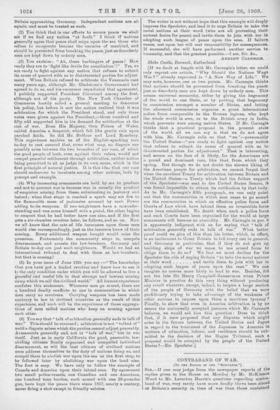sequence, it may have been a descendant. (1) I never
attached importance to the limitation of
Some of the birds' calls have been taken down in their armaments, since no nation can he expeoted to specifically names. Cuckoo is one of the obvious call-names, though most agree that any other nation should have rights more than people pronounce the name differently from the call; they another, the seas being open to all. Sir Edward Grey put speak of " cook.00," while the bird calls " enkk-oo." Peewit that clearly not long since when explaining the difficulty of
Britain approaching Germany. Independent nations are all equals, and must be treated as such.
,(2) You think that in our efforts to secure peace we shall err if we find any nation "at fault," I think if nations generally agree that peace shall reign upon the sea those who refuse to co-operate become the enemies of mankind, and should be prevented from breaking the peace, just as disorderly men are kept down by orderly men.
{3) You exclaim: " Ab, these harbingers of peace! How ready they are to 'fight like devils for conciliation'!" Yes, we are ready to fight against any nation that refuses to submit its cause of quarrel with us to disinterested parties for adjust. moist. When Britain refused to arbitrate the Venezuela case many years ago, although Mr. Gladstone's Government had agreed to do so, and his successor repudiated that agreement, I publicly supported President Cleveland among the first, although not of his party. The New York Chamber of Commerce hastily called a general ' meeting to denounce his policy, but before it met time nation realised that it was arbitration for which the President stood, and only three votes were given against the President,three hundred and fifty odd supported him in his demand for arbitration at the risk of war. Even His Majesty, then Prince of Wales, cabled America a despatch, which fell like gentle rain upon parched fields. So did Mr. Balfour and Lord Rosehery. This experience enables us of the English-speaking race to-day to rest assured that, come what may, no dispute can possibly arise between the two branches of our race, of which the good people of both, even against their rulers, would not compel peaceful settlement through arbitration, neither nation being permitted to sit as judge in its own cause, which is the first principle of natural justice. It is this idea that our race should endeavour to inculcate among other nations, both by precept and example.
(4) Why increasing armaments are held by me to produce and not to prevent war is because war is usually the product of suspicion arising from these, culminating in jealousy and hatred ; when that stage is reached a spark may set fire to the flammable mass of jealousies aroused by each Power adding to its weapons. If two neighbours have a misunder- standing and one arms himself with a pistol, the other begins to suspect that he had better have one also, and if the first gets a six-chamber revolver later, he follows, and so on. Now we all know that the rate of life insurance upon these mon would rise correspondingly, just as the insurers knew of their arming. Every additional weapon bought would raise the premium. Fortunately the community steps in, compels disarmament, and arrests the law-breakers. Germany and Britain to-day are just such neighbours. Would we had an international tribunal to deal with them as law-breakers; but that is coming!
(5) In your issue of June 12th you say :—" The knowledge that you have got a leaded revolver and know how to use it is the only condition under which you will be allowed to live a peaceful and useftil life in that strange and lawless mining camp which we call the civilised world." All human experience confutes this statement. Wherever men go armed, there are a hundred deadly conflicts to one in communities in which fnen' carry no revolvers. Carrying weapons has been made contrary to law in civilised countries as the result of this experience, and such will be the experience of those aggrega- tions of men called nations who keep on arming against each other.
(6) You any that " talk of arbitration generally ends in talk of war." This should be reversed ; arbitration is not " talked of " until a dispute arises which the parties cannot adjust peaceably. Armaments generally end, not in "talk of war," but in war
Just as in early. California the good, peaceable, law- abiding citizens finally organised and compelled individual disarmament, so will the best citizens of civilised nations Soon address themselves to the duty of nations doing so, and compel theM to abolish war upon the BOA as the first step, to be followed later by abolishing war upon the land also. The first is easy. We have only to follow the example of Canada and America, upon their inland seas. By agreement two small police-vessels, one Canadian and one American, One hundred tons burden, each armed with one 28-pounder gun, have kept the peace there since 1817, nearly a century, never firing a shot except in friendly salutes. The writer is not without hope that this example will deeply impress the Spectator, and lead it to urge Britain to take the naval nations at their word (who are all protesting their earnest desire for peace) and invite them to join with her in adopting such league of peace upon the seas. If failure ensue, not upon her will rest responsibility for consequences. If successful, she will have performed another service to humanity, and that the greatest possible.-1 am, Sir, &o.,
ANDREW CARNEGIE.
Skibo Castle, Dornoch, Sutherland.
[If we dealt at length with Mr. Carnegie's letter, we could only reprint our article, "Why Should the Nations Wage War P" already reprinted in "A New Way of Life." We may note, however, one or two points. Mr. Carnegie thinks that nations should be prevented from breaking the peace just as disorderly men are kept down by orderly men. This means universal monarchy, either by giving the hegemony of the world to one State, or by putting that hegemony in commission amongst a number of States, and letting the aforesaid commission organise a great international police force comparable to the Roman legions, who kept the whole world in awe, or to the British army in India, which prevents wars among native States. If Mr. Carnegie thinks that a practical proposal in the present state of the world, all we can say is that we do not agree with him. Mr. Carnegie .tells us that "we "—presumably the United States—" are ready to fight against any nation that refuses to submit its cause of quarrel with us to disinterested parties for adjustment." That is interesting, and seems ou the face of it likely, for the Americans are a proud and dominant race, like that from which they spring. But though we do not doubt the sincere liking of the American people for arbitration, we cannot forget that when the excellent Treaty for arbitration between Britain and the United States—a Treaty which lied the fullest support. of the Spectator—was sent to the United States Senate, it was found impossible to obtain its ratification by that body. As to Mr. Carnegie's fifth paragraph, we can only point out that the communities in which mon cease to go armed are the communities in which an effective police force and Courts of Law which have behind them an irresistible force have been established. No doubt when such a police force and such Courts have been organised for the world at large armaments will become an absurdity. Mr. Carnegie in par. 6 is apparently indignant with us for saying that talk of arbitration generally ends in talk of war." What better. proof could we give of this than his letter, which, in effects is an incitement to Great Britain to tell every one in general, and Germany in particular, that if they do not give up building ships of war we mean to use armed force to oblige them to do so P We fear we must decline for the Spectator the role of urging Britain " to take the naval natious at their word and invite them to join with her in adopting such league of peace upon the seas." We can imagine no course more likely to lead to war. Besides, did not the late Sir Henry Campbell-Bannerman when Prime Minister in practice do this very thing without producing any result whatever, except, indeed, to inspire a large section of the people of Germany with the belief that we were perfidiously trying to take advantage of the weakness of other nations to impose upon them a maritime tyranny P Finally, to show that even in America arbitration is by no means the universally accepted panacea which Mr. Carnegie believes, we would ask him this question : Does he drink that, if it were proposed that any disputes which might arise in the future between the United States and Japan in regard to the treatment of the Japanese in America, in matters of education, labour, and residence should be sub- mitted to the decision of the Hague Tribunal, such a proposal would be accepted by the people of the United States P—ED. Spectator.]



























































 Previous page
Previous page